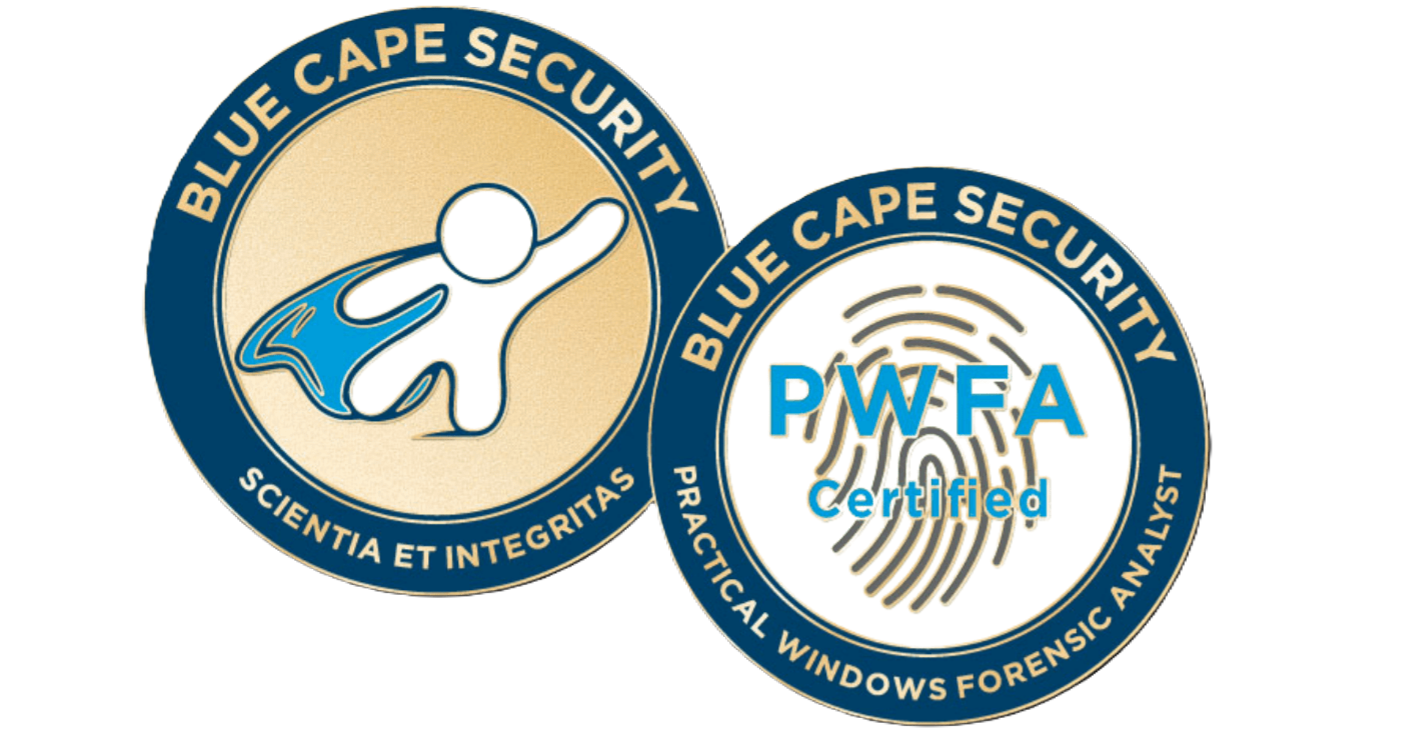Practical Windows Forensic Analyst (PWFA) exam
Practical Windows Forensic Analyst (PWFA) exam.
The Practical Windows Forensic Analyst (PWFA) is a performance-based exam designed to validate skills in Windows digital forensics and investigation.
Training: Practical Windows Forensics
To prepare for the PWFA, Blue Cape offers the Practical Windows Forensics course. This self-paced training consists of 18 explanatory modules and 52 practical labs. Together they provide both theoretical knowledge and hands-on practice for investigating and analyzing Windows-based attacks and intrusions.
The topics include:
- Windows registry
- NTFS
- MFT records
- Timestamps
- Windows Event Logs
- Memory analysis
- Tools (including Eric Zimmerman Tools, KAPE, RegRipper, Volatility3)
- Documentation
The course begins with setting up a forensic lab environment and collecting data (disk and memory). This evidence is then used to create a triage collection, which serves as the foundation for the analysis modules.
The structure makes the training highly practical and easy to follow. By combining theory with hands-on triage and analysis, it provides a strong methodology for Windows forensic investigations.
Preparation: FOR200 - Investigation Scenarios
To apply the knowledge gained from the training, Blue Cape provides 4 investigation scenarios Each scenario includes a case description with research objectives, a VM containing digital evidence, and tools to support the investigation.
Although they follow the same general outline as the course, these scenarios are clearly a step up. To answer the research questions, you must analyze additional artifacts and apply techniques that go beyond the training material. This makes FOR200 an excellent way to practice and deepen the knowledge gained in the course.
A stronger focus is placed on documentation compared to the training. Blue Cape provides templates for both a timeline report and a written report.
The scenarios cover a broad range of cases, from data exfiltration to data breaches. Each also includes a video walkthrough with explanations of the scenario, investigation steps, and documentation process.
The Exam: PWFA
The PWFA exam itself is also scenario-based and very practical. The objective is to provide a report (in a format of your choice) that answers specific research questions. The necessary digital evidence and tooling are provided in a VM.
The exam felt like a natural step up from the investigation scenarios. Using the same methodology, I examined the artifacts, documented findings, and gradually built a clear picture of the case.
While working through the evidence, the narrative of the scenario became apparent and shaped the direction of my final report. The exam was challenging and highly practical experience. It was a great opportunity to apply my gained knowledge in a real-world setting and further strengthen my skills.
The Result
After submitting my report, I received my results within a week. I’m proud to share that I passed the exam with distinction (86.7 of 100).
Final Thoughts
I thoroughly enjoyed the training, scenarios, and exam. The investigative process felt like solving puzzles, following trails of evidence, and piecing them together to prove or disprove hypotheses.
The only improvement I would suggest is to also receive feedback alongside the score. Knowing where points were lost would help identify specific gaps and further strengthen skills. After reaching out by email, I did receive very detailed feedback on both my analysis and my report within 24 hours, which was very helpful.
One small challenge was that the VM provided for the exam ran somewhat slowly when handling large disk images on more complex tasks. Looking back however, I realize that I did not need to perform those heavier processes.

